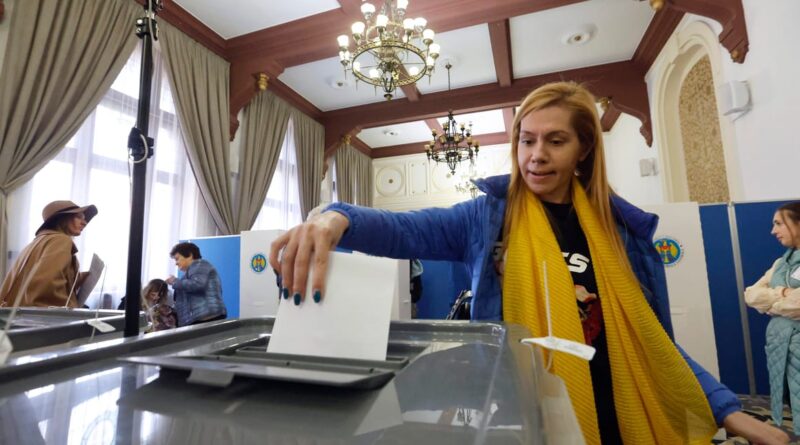Moldova Thwarts Alleged Russian-Backed Plan to Disturb Peace
On a September day in 2025, monumental events unfolded in Moldova. The authorities launched 250 orchestrated raids and apprehended numerous individuals in connection to a suspected scheme to incite public unrest and destabilize the state, which was allegedly backed by Russia. The looming parliamentary election, perceived as pivotal, appeared to be the tipping point for these acts. Aided by law enforcement, the operation saw more than 100 targets across numerous locations within the state.
In this sweeping operation, officials detained seventy-four individuals for a tentative duration of 72 hours. The head of prosecution, Victor Furtuna, from Moldova’s Chief Prosecutor’s Office For Combating Organized Crime and Special Cases, confirmed the number. Amid these confusing times, the citizens of Moldova were dealing with the imminent process of electing a fresh legislative assembly. Their choices were instrumental in deciding the course of the country’s future – closer alliance with the European Union or strengthening relations with Russia.
The Moldovan police were the first to announce that the alleged scheme was engineered from the Russian Federation with support from criminal entities. While revealing further details, Prosecutor Furtuna pointed out that the majority of the suspects were believed to have frequently journeyed to Serbia. Their ages ranged from 19 to 45 years and it was in Serbia where they supposedly underwent training.
Viorel Cernauteanu, the chief of Moldova’s police force, shed light on some intriguing aspects of the plot. He indicated that a portion of the suspects were unaware of the real intention behind their travels. These trips were eloquently masked as pilgrimages; only subsequent to their arrival did they become entangled in clandestine activities intended to provoke chaos and destabilize the country.
Cernauteanu hastened to clarify that this extensive inquiry was not politically driven. The focus was primarily on the suspects and their potential criminal intentions which trickled down from their sojourn in Serbia. In doing so, the authorities aimed to document these activities and the organization behind these individuals who attended the training.
Public announcements made following the raids highlighted concerns regarding external influences meddling in Moldovan politics. Allegedly, a significant amount of Russian capital, amounting in hundreds of millions of euros, was being funneled towards dominating the outcome of the upcoming elections. Claims were raised about falsehoods being disseminated among the populace on a daily basis.
Echoing the fears of external influences corrupting the electoral process, the authorities painted a bleak picture of large numbers of individuals remunerated handsomely to incite discord, violence, and fear. A plea was extended to the citizens urging them to guard their homeland from falling victim to foreign pursuits. It was imperative to keep Moldova invulnerable to forces that sought to manipulate it for their own gains.
Further accusations pointed towards the presence of Kremlin allies within the country. These ‘accomplices’, as they were referred to, were allegedly prepared to trade their national loyalty for financial gain. Such scathing indictments reiterated the palpable tension between Moldova and perceived external influences, particularly from Russia.
Historically, Moldovan authorities have frequently attributed Russia with subversive strategies such as meddling in domestic elections, proliferation of disinformation campaigns, and illicit financial support to pro-Russian political entities. The goal of these alleged Russian actions, as per Moldova, was to divert the country from its goal of European Union integration.
In the face of these allegations, Moscow has consistently refused any involvement in Moldovan affairs. The claim stands that no behind-the-scenes orchestration of disrupting Moldova’s political landscape was carried out by the Russian State. However, such denials provided little solace amid rising tensions.
One of the crucial points in the relationship between Russia and Moldova was the year 2022 when Russia staged a full-scale invasion of Ukraine. In the aftermath of this event, Moldova made a significant move by applying for EU membership and was granted the status of a candidate in the same year.
The European Union validated Moldova’s candidature and finalized plans to commence negotiation talks in the following year. This strategic move in favour of the west by Moldova, towards the EU’s sphere of influence, further fueled the existing tensions between them and Russia.
Moldova’s attempt to pivot towards the west was seen as a direct challenge by Moscow, escalating tensions to a new peak. The country’s resolve to leave its past behind and take a step towards the opportunities that EU membership presented made visible ripples in the balance of power.
In the end, the course Moldova chooses will not only redefine its relations with the world powers but will also mold the lives of citizens who call Moldova home. Whether they align closer with the European Union or with Russia, the choice reverberates beyond mere political realms encapsulating cultural, economic, and societal implications.
The heightened geopolitical tension, coupled with internal strife, indicates an intricate and challenging path that lies ahead for this Central European nation. And as these arrests and strife highlight, themes of foreign influence, uncertain political ties, and the struggle for a future trajectory continue to steer Moldova’s course.
This intricate affair serves not only as a revealing insight into the circumstances surrounding a small country caught in geopolitical crossfire but also a stark reminder of the potential implications global politics can have on domestic stability and sovereignty.

